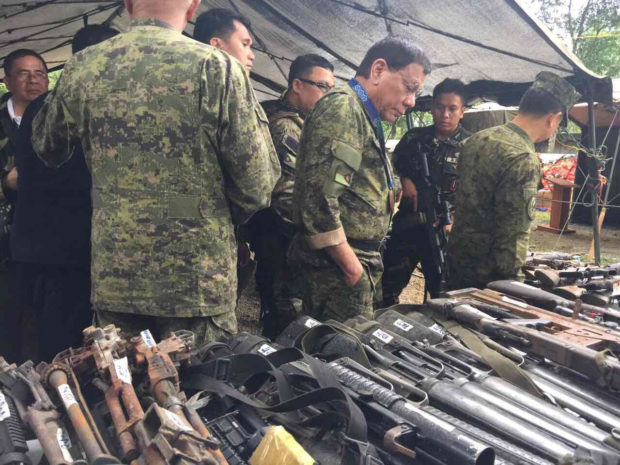Duterte finally lands in Marawi, cheers up troops

President Duterte sneaks into Marawi City and talks to troops. He was also presented on Thursday weapons seized from the fighting since May 23. Army Photos through Maj Frank Sayson
President Rodrigo Duterte on Thursday finally set his foot in the conflict-torn Marawi City, Malacañang said.
Clad in a camouflage uniform, Duterte flew into the city on a helicopter at around 3 p.m. and received a briefing from military officials deployed in the area.
The President briefly talked to troops at Camp Ranao before returning to Davao City.
The chief executive finally reached Marawi after two failed attempts in the past.
Article continues after this advertisement
Col. Jo-ar Herrera, spokesperson of the Army’s 1st Infantry Division, said Duterte’s visit was proof of his solid support for the troops.
Article continues after this advertisement“The soldiers and police are very happy over his visit because this proves that the president is very firm, very dedicated in supporting most specially the operations here,” Herrera said.
Herrera said the President thanked the heroism of troops fighting the Islamic State-linked Maute militants in the city. “Nagpapasalamat siya dahil sa heroism and sacrifices ng ating mga [sundalo] despite the challenges na hinaharap ng ating mga [sundalo] dito. Alam natin na si Pangulo ay talagang malapit siya sa ating mga sundalo at ito’y talagang ng boost sa fighting spirit ng ating mga [sundalo] at siya ay talagang very supportive dito sa atin,” Herrera said.
The military official said the commander in chief gave personal supplies to troops. “Well the usual, nagbigay siya ng suporta sa ating mga [sundalo]. Ang aking nakita doon ay mayroon din naibigay na mga goods para sating mga sundalo at tinignan nya rin yung mga iba’t ibang firearms recovered,” Herrera said.
Martial law extension
Duterte told Congress in a letter this week that even though troops have regained control of much of Marawi and killed hundreds of militants, “the rebellion persists and a lot more remains to be done to completely quell the same.” The militants’ leadership, he said, remains largely intact and has funded diversionary attacks on other southern cities.
The seven-page letter, a copy of which was seen by reporters Thursday, aims to convince lawmakers to extend Duterte’s 60-day declaration of martial law in the south until the end of the year. The statements in the letter appear to differ from his assurance last week that the Marawi crisis, the most serious he has faced so far, could end in 10 to 15 days.
In a separate report to the Senate, the military said the attackers’ main leader, Isnilon Hapilon, “allowed the escape of 96 young recruits fighting in Marawi and instructed them to continue jihad outside Marawi.” Jihad is an Arabic word that militants use to refer to “holy war.”
Waving IS group-style black flags, the heavily armed fighters stormed into Marawi, a center of Islamic faith in the south of the predominantly Roman Catholic nation, on May 23, occupying buildings, houses and mosques and taking hostages. Several foreign fighters, including 20 Indonesians and a Malaysian financier known as Mahmud bin Ahmad, joined the insurrection, the president said.
Officials say at least 565 people, including 421 militants and 99 soldiers and policemen, have been killed in the worst urban uprising by Muslim militants in the volatile south in decades. Nearly half a million residents have been displaced in Marawi and outlying towns by the fighting.
Duterte wrote in his letter that the leadership of the Marawi siege “largely remains intact despite the considerable decline in the number of rebels fighting in the main battle area.” Other radical armed bands “are ready to reinforce Isnilon Hapilon’s group or launch diversionary attacks and similar uprisings elsewhere,” he said.
Intelligence reports that Hapilon sent funds and ordered allied militants to launch attacks in key cities across the south have been validated, he said.
The attackers’ lasting power and large arsenal of weapons have surprised Duterte and his top security officials, who acknowledged they underestimated the combat strength of the militants and their preparations, including the stockpiling of assault firearms in lakeside Marawi. Troops long used to fighting insurgents in the jungles have struggled to rout the gunmen from Marawi’s dense urban sprawl.
Despite the large number of troops and checkpoints around the city, “there have been reported entries of reinforcements, weapons, ammunitions and other logistical supplies from outside Marawi city through clandestine routes,” Duterte told the lawmakers. Followers of local politicians have backed the siege, which was partly funded by drug money, he said.
The crisis has sparked alarm that the IS group may be gaining a foothold in Southeast Asia, through allied local militants, as it faces major setbacks in Syria and Iraq. The United States and Australia have deployed surveillance planes to Marawi, and China has provided weapons for Filipino troops, including those fighting in the besieged city. With a report from Associated Press/ JPV/ac